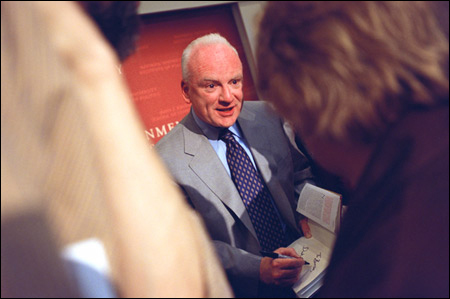Clarke says Patriot Act preserves civil liberties
‘I can’t find anything wrong with it [the Patriot Act], and if I’d had it prior to 9/11, it would have been a hell of a lot easier to stop 9/11.’

People who care about civil liberties in the United States should embrace rather than fight the USA Patriot Act, former Bush administration anti-terrorism coordinator Robert Clarke told a standing-room-only audience at the John F. Kennedy School of Government April 21.
Though the Patriot Act has been assailed as an attack on civil liberties, Clarke said the act provides law enforcement tools that could prevent another major terrorist attack. And a second attack is sure to prompt even harsher legislation.
“I would argue the thing that you should do today that most protects civil liberties in this country is to help prevent another major terrorist attack, because no matter how many of us send checks to the ACLU, if there’s another major terrorist attack in this country … hold onto that Bill of Rights, because it’s going fast,” Clarke said. “So be very, very careful about opposing things like the Patriot Act. If you believe in civil liberties, you’ve got to stop that next big attack.”
Clarke said he believes if legislation similar to the Patriot Act had been passed before Sept. 11, 2001, it may have helped prevent that day’s terrorist attacks.
“I can’t find anything wrong with it and if I’d had it prior to 9/11 it would have been a hell of a lot easier to stop 9/11,” Clarke said.
Clarke, an adjunct lecturer in public policy at the Kennedy School and author of “Against All Enemies: Inside America’s War on Terror,” served as a senior White House adviser for four presidents, including a stint as national coordinator for security, infrastructure protection, and counter-terrorism from 1998-2002. Clarke was interviewed during Wednesday’s event by Belfer Center for Science and International Affairs Director Graham Allison in the John F. Kennedy Jr. Forum.
The recent publication of Clarke’s book, coupled with his testimony before the National Commission on Terrorist Attacks upon the United States, catapulted him into the national limelight in recent weeks. His assertion that fighting al Qaeda was not an urgent priority for the Bush administration in the months before Sept. 11, 2001, won Clarke praise from administration opponents and made Clarke a target of criticism for administration supporters.
In answering questions from Allison and from the audience, Clarke covered many aspects of the United States’ war on terror. Clarke repeated his criticism of Bush administration tactics, saying that the invasion of Iraq played right into al Qaeda’s hands. Not only did it fulfill al Qaeda leader Osama bin Ladin’s predictions that the United States would invade and occupy an oil-producing Arabic country, Clarke said, it is also draining resources that could be used more fruitfully in the fight against terrorism.
Clarke repeated his insistence that Iraq, though run by an oppressive regime, posed no immediate threat to the United States, either through support for terrorism or through its possession of weapons of mass destruction.
Clarke said the war on terror is actually a civil war within Islam between the extreme version preached by Osama bin Ladin and more moderate elements. So far, the U.S. is losing the battle for ideas in the Islamic world. Al Qaeda is more sophisticated than we’ve given it credit for, Clarke said, and is far better received among its Islamic target audience than the United States.
To ultimately win the war on terror, Clarke said the United States has to somehow begin winning over the millions of Muslims who, though not actively fighting, are supporting radical causes monetarily and through other kinds of support. The U.S. took a step away from that goal by restricting visas for students from some foreign nations who want to study here.
Part of the problem, Clarke said, is that the United States, while talking about democracy, has supported oppressive Arabic regimes. The downside of encouraging democracy in Islamic countries, he said, is that we may not like the outcome of their democratic elections.
Resolution of the Palestinian issue is essential, but not enough on its own to give the United States a favorable image among Muslims.
When asked about his own apology to the nation for failing to stop the Sept. 11, 2001, attacks during testimony before the National Commission on Terrorist Attacks, also known as the 9/11 commission, Clarke said victims of such tragedies need psychological support as well as physical support from their government.
Clarke said apologies should only be given if they’re genuine, so President Bush shouldn’t give one if he doesn’t think he did anything wrong in the days before the 9/11 attack.
“It’s quite clear the president and others feel they have nothing to apologize for and so they shouldn’t,” Clarke said.
As far as security today, Clarke said though many attacks have been stopped, there have also been many more attacks by al Qaeda worldwide since Sept. 11 than there were before. In the United States, he said, airlines are undoubtedly safer, but the nation hasn’t spent the money needed to make trains, container ships, and other potential terrorist targets safer.
In response to a question from the audience, Clarke said the recent bombings in Spain indicate that an al Qaeda attack before the U.S. presidential elections in November is possible. He said the bombings could be timed to influence the outcome, but also said a case could be made that either major party candidate would be acceptable from al Qaeda’s point of view.




